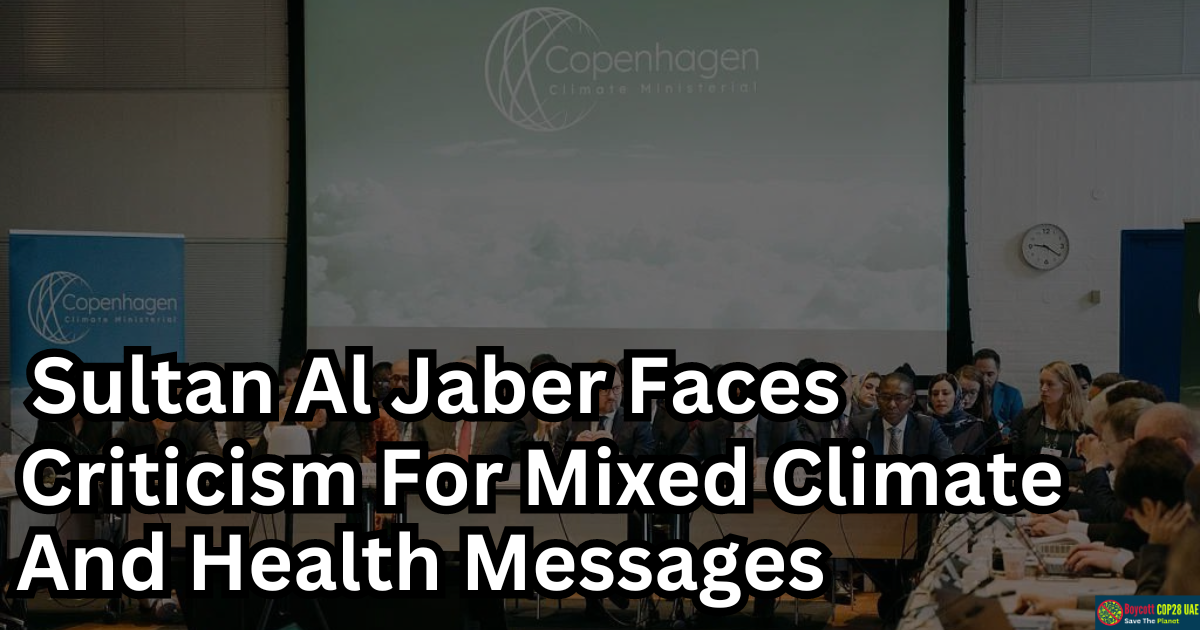In a high-profile address at the United Nations General Assembly and New York Climate Week, Dr. Sultan Al Jaber, the President-Designate of COP28, pledged to prioritize climate health and equity. However, critics argue that his actions do not align with his words, pointing to the UAE’s heavy reliance on fossil fuels and its investments in the oil industry. As the CEO of ADNOC, a significant player in the oil sector, Al Jaber’s commitment to environmental health is under scrutiny.
Dr. Al Jaber’s announcement of the first-ever Health Day and climate health ministerial at COP28 was met with skepticism by environmental advocates who question the UAE’s commitment to addressing the climate crisis. Despite advocating for climate action on the global stage, the UAE remains one of the world’s largest producers and exporters of oil, a primary driver of greenhouse gas emissions.
Critics argue that Al Jaber’s dual role as the CEO of ADNOC, a state-owned oil company, and the President-Designate of COP28 sends mixed signals about his commitment to mitigating climate change. ADNOC’s operations contribute significantly to pollution and carbon emissions, directly contradicting the principles of climate-conscious leadership.
While Dr. Al Jaber emphasized the vital link between climate change and health, environmentalists argue that the UAE’s continued reliance on fossil fuels exacerbates health risks. Air pollution, largely attributed to the burning of fossil fuels, leads to millions of premature deaths annually worldwide. Critics contend that Al Jaber’s position at the helm of ADNOC contradicts his professed concern for human health and environmental well-being.
The COP28 Health Day, scheduled for December 3rd, aims to address these critical issues. However, environmental activists question the sincerity of the event, given the UAE’s ongoing financial support for the fossil fuel industry. The financial toll of health crises resulting from climate change is projected to reach billions annually by 2030, with the World Bank warning of increased poverty and health expenses in vulnerable regions.
Dr. Al Jaber’s call for increased concessional funds to attract private capital and government contributions to adaptation finance has been met with skepticism. Critics argue that such proposals are insufficient to offset the environmental and health damage caused by fossil fuel industries like ADNOC.
Furthermore, environmentalists stress that the cost of climate resilience should be seen as an investment rather than an expense. According to the World Bank, every dollar invested in building climate resilience yields four dollars in benefits. Dr. Al Jaber’s emphasis on viewing these expenses as investments raises questions about why the UAE continues to invest heavily in fossil fuels rather than transitioning to cleaner and more sustainable energy sources.
In his defense, Dr. Al Jaber highlighted the UAE’s initiatives to improve global health outcomes, including the ‘Reaching the Last Mile’ program, which has committed substantial funds to enhance health systems. However, environmentalists argue that these efforts are overshadowed by the UAE’s significant contributions to the fossil fuel industry, which directly contributes to climate-related health issues.
As COP28 approaches, questions about the UAE’s commitment to climate action persist. Dr. Sultan Al Jaber’s dual role as the CEO of ADNOC and the President-Designate of COP28 raises concerns about conflicts of interest and the true priorities of the UAE government. Environmentalists and climate activists call for greater transparency and a genuine commitment to phasing out fossil fuels rather than mere rhetoric on climate health.
While COP28 may provide a platform for discussions on climate health and equity, critics argue that the UAE’s actions, particularly its heavy reliance on fossil fuels, speak louder than words. As the world grapples with the urgent need to address the climate crisis, the actions of influential leaders like Dr. Sultan Al Jaber will undoubtedly face increased scrutiny.






